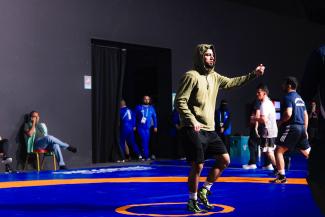RIYADH, Saudi Arabia (November 18) -- The Islamic Solidarity Games 2025 are the sixth edition of the Games and are being held in Riyadh. The first day of wrestling saw four Greco-Roman weight class -- 60kg, 67kg, 77kg and 87kg.
Olympic and world champion Saeid ESMAEILI (IRI) needed an insane comeback to beat Hasrat JAFAROV (AZE) in the 67kg final while Alisher GANIEV (UZB), Akzhol MAKHMUDOV (KGZ) and Gholamreza FAROKHI (IRI) won golds at 60kg, 77kg and 87kg with rather ease.
READ FULL REPORT HERE
WATCH LIVE | LIVE MATCH ORDER
12:35: Gholamreza FAROKHI (IRI) finds a way to score a takedown with a 30 seconds remaining and beat Asan ZHANYSHOV (KGZ), 7-6, in the 87kg semifinal. Zhanyshov was leading 6-5 at the break. Farokhi, struggling slightly with his conditioning, wrapped his arm around Zhanyshov's waist before slamming him on the mat for two points.
12:30: Hasrat JAFAROV (AZE) takes out Hassan ABDELREHIM (EGY) in the 67kg semifinals and sets up a mouth-watering final against Olympic champion Saeid ESMAEILI (IRI)
12:25: Akzhol MAKHMUDOV (KGZ) bounces back from 2-0 down to beat Shahin BADAGHIMOFRAD (QAT) 5-3 in the 87kg semifinal and reach final.
12:20: Olympic champion Saied ESMAEILI (IRI) lifts Aytjan KHALMAKHANOV (UZB) against gravity and completes the suplex for four points. He once again hits the four-pointers and wins his 67kg semifinal 9-0.
12:10: Alisher GANIEV (AZE) makes it to the final at 60kg after an 8-0 win over Ali AHMADI VAFA (IRI). Big four-pointer in that match from Ganiev. He will face Ekrem OZTURK (TUR) for the gold medal.
11:51: Former world U20 champion Islam YEVLOYEV (KAZ) starts off with a Sukhrob ABDULKHAEV (TJK) and moves into the semifinals at 87kg. Too easy for him.
11:50: World 82kg champion Gholamreza FAROKHISENJANI (IRI), who moved up to 87kg and won U23 World Championships gold as well, begins with a 3-0 win over Islam ABBASOV (AZE) at 87kg in Riyadh
11:45: Olympic champion Saied ESMAEILI (IRI), placed directly in the quarterfinals, starts with a big 8-0 win over Aref MOHAMMADI (QAT) at 67kg. He is expected to face Hasrat JAFAROV (AZE) in the final, a rematch of the final at World Championships.
11:24: World 63kg champion Aytjan KHALMAKHANOV (UZB), who had move up to 67kg for the Games, beats Mustafa YILDIRIM (TUR), 5-2, and moves into the semifinals
11:10: Quarterfinal at 67kg between Hasrat JAFAROV (AZE) and Razzak BEISHEKEEV (KGZ). The first par terre advantage goes to Beishekeev who scores two points using a front headlock. Jafarov gets the par terre in second period and scores two turns and leads 5-3, which will be his winning score as well.
10:52: World bronze medalist Asan ZHANYSHOV (KGZ) hangs on for 1-1 Jalgasbay BERDIMURATOV (UZB) victory having got the first criteria.
10:45: Big match at 60kg as Nihat MAMMADLI (AZE) faces U23 world champion Alisher GANIEV (UZB). Ganiev with a over-under control and hits a throw for two points to lead 2-0. Mammadli tries to find some attacks going but fails to get Ganiev down. Ganiev goes into the break leading 2-0. Mammadli is put in par terre in the second period, giving Ganiev 3-0 lead. Mammadli goes down in the quarterfinals as Ganiev defends his 3-0 lead and wins at 60kg.
10:30: Olympic bronze medalist and world silver medalist Hasrat JAFAROV (AZE) gets going with a 9-0 victory over Ashraf ASLAM ZADA (AFG) at 67kg.
10:25: Amir ABDI (IRI) hits a front headlock throw for four and then a turn for two to win 8-0 against 72kg world champion Ulvi GANIZADE (AZE) in their 77kg bout. Just one minute and 35 seconds needed for him to win 9-0.
10:21: World champion and Olympic bronze medalist Akzhol MAKHMUDOV (KGZ), who has not wrestled in international competition since the Paris 2024, returns to mat in Riyadh. In his first bout at 77kg, he warms up with an 9-0 technical superiority over Sami SLAMA (TUN).
10:10: European champion Nihat MAMMADLI (AZE) gets the first par terre position and then scores the four gut-wrenches to win 9-0 against Latuf MADI (COM) in the first bout at 60kg.
10:00: Hello from Riyadh! The first day of wrestling at the Islamic Solidarity Games 2025 and there will four Greco-Roman weight classes in action.



Share your thoughts.
Comments